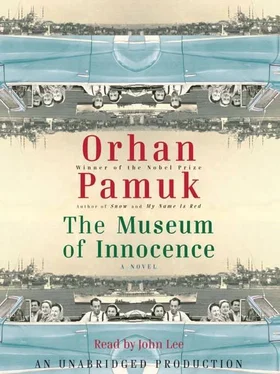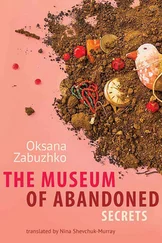No sooner had I taken my seat next to Berrin than the image of Füsun fired up in my mind’s eye with full force, as if a television set had just been plugged in. But this time the light from that image exuded joy, not sadness, illuminating not just this evening but my entire future. For a brief moment I recognized myself among those men whose real source of happiness is their secret lover, but who pretend it is their wives and children-I, too, was acting as if it was Sibel who made me happy, and we weren’t even married yet.
After chatting for a while with the gossip columnist, my mother came over to our table. “Take care around these journalists, will you?” she said. “They write all sorts of lies; they do terrible mischief. And then they make threatening calls to your father, asking him to buy more advertising space. Why don’t you two get up and start the dancing. Everyone is waiting for you.” She turned to Sibel. “The orchestra is warming up. Oh how sweet you are, how beautiful.”
Sibel and I danced to a tango that the Silver Leaves were playing. All the guests were watching, and this gave our happiness the illusion of depth. Sibel draped her arm over my shoulder as if to embrace me, and pressed her face against my chest as close as if we were dancing alone in a dark corner of a discotheque; from time to time she smiled and murmured something, and after we’d made a turn I would look over her shoulder at whatever person she had remarked on a moment ago-the waiter whose heavy tray had not prevented his pausing to smile at our bliss, or her mother weeping for joy, or a lady whose hair resembled a bird’s nest, or Nurcihan and Mehmet turning their backs on each other now that we had left them alone, or the ninety-year-old gentleman who had made his fortune during the Great War and who could no longer eat without the help of his servant, who was wearing a string tie-but I did not once look at the back of the garden, where Füsun was sitting. As Sibel kept up her cheerful chatter, it was better if Füsun didn’t see us.
There was a burst of applause; it didn’t last long, and we carried on dancing as if nothing had happened. When other couples got up to dance, we returned to our table.
“You did very well. You looked so good together,” said Berrin. At that point, I think, Füsun was not yet among the dancers. Sibel was fretting so over Nurcihan and Mehmet’s lack of progress that she asked me to speak to Mehmet. “Tell him to come on a little stronger,” said Sibel, but I did nothing. Berrin got involved at this point, and in a whisper she told us that forcing the issue was a bad idea; she’d been watching the whole thing from her side of the table and it wasn’t just Mehmet; they had both been standoffish, or at least nervous, and if they didn’t like each other there was no point in pushing them together. “No,” said Sibel, “weddings cast a kind of spell. It’s at weddings that many people meet the person they end up marrying. It’s not just girls that get into the mood at weddings; it’s boys, too. But you have to help them along…” “What are you talking about? Tell me, too,” said my brother as he joined the whispering conversation, and once he had been apprised of things, he pointed out in hortatory tones that while the days of arranged marriages were over, Turkey wasn’t Europe, and there weren’t many ways couples could get to know each other, with the result that a lot of the burden had fallen on the shoulders of well-meaning informal matchmakers. Then, apparently forgetting that Nurcihan and Mehmet had sparked the debate, he turned to Nurcihan, saying, “I imagine, for example, that you would never consent to a marriage arranged by a matchmaker, am I right?”
“So long as the man is nice, it doesn’t matter how you find him, Osman Bey,” said Nurcihan with a giggle.
We all laughed as if we’d heard something so outrageous it could only be a joke. But Mehmet turned deep red and looked away.
“Don’t you see?” Sibel whispered into my ear a bit later. “She frightened him off. He thought she was making fun of him.”
I was not watching the people on the dance floor at all. But when our museum was established, Mr. Orhan Pamuk recalled that Füsun had danced with two people early on. He didn’t know or couldn’t remember her first dance partner, though I worked out that it must have been Kenan from Satsat. The second, however, was the young man with whom I had exchanged glances a short time earlier while visiting the Pamuk family table-Orhan Pamuk himself, as he proudly told me years later. Those interested in Orhan Bey’s own description of how he felt while dancing with Füsun should look at the last chapter, entitled “Happiness.”
While Orhan Bey was dancing the dance that he would describe to me with utter frankness many years after the fact, Mehmet decided he had had enough of Nurcihan’s giggles and our double entendres about love, marriage, matchmakers, and “modern life” and left the table. At once our spirits dropped.
“That was very rude of us,” said Sibel. “We broke the boy’s heart.”
“Don’t say that looking at me,” said Nurcihan. “I didn’t do any more than you did. You’ve all had a lot to drink and you’re having a good time. Mehmet is the one who is frustrated in life.”
“If Kemal brings him back to the table, will you behave nicely, Nurcihan?” asked Sibel. “I know you could make him very happy. And he you. But you have to treat him well.”
It seemed to please Nurcihan to see Sibel so openly determined to set her up with Mehmet. “No one’s talking about getting married tomorrow,” she said. “He met me, he could have said one or two nice things to me.”
“He is trying. He’s just not used to talking with a girl as self-possessed as you are,” said Sibel; giggling, she whispered the rest of what she had to say into Nurcihan’s ear.
“Do you people know why boys in this country never learn how to flirt with girls?” asked my brother. He assumed that charming expression he wore whenever he’d had something to drink. “There’s nowhere to flirt. We don’t even have our own word for ‘flirt.’”
“I remember your idea of flirting,” said Berrin. “Before we got engaged, you’d take me to the cinema on Saturday afternoons… You’d bring a portable radio with you, so that you could find out about the Fener match during the five-minute intermission.”
“Actually, I didn’t bring the radio with me to tune in to the match, but to impress you,” said my brother. “I was proud to be the owner of the first transistor radio in Istanbul.”
Then Nurcihan admitted that her mother used to brag about being the first person in Turkey to use an electric blender. She went on to tell us how, in the late 1950s, years before canned tomato juice became available, her mother was offering her friends tomato, carrot, celery, beet, and radish juice when they came over to play bridge, and as the ladies were all sipping from crystal glasses, she would proudly take them into the kitchen to show them the first electric blender to arrive in the country. As we listened to light music from that era, we remembered how the Istanbul bourgeoisie had trampled over one another to be the first to own an electric shaver, a can opener, a carving knife, and any number of strange and frightening inventions, lacerating their hands and faces as they struggled to learn how to use them. We talked about all those tape recorders brought back from Europe that usually broke on first use, and the hair dryers that blew the fuses, the coffee grinders that frightened the servant girls, the mayonnaise makers for which no spare parts were to be found in Turkey, but which no one had the heart to throw away and so relegated to a remote corner of the house to gather dust. Meanwhile, as we were laughing about all this, You-Deserve-It-All Zaim sat down in the seat Mehmet had vacated, and within four or five minutes he had managed to enter the swim of the conversation and was whispering into Nurcihan’s ear, making her laugh.
Читать дальше












